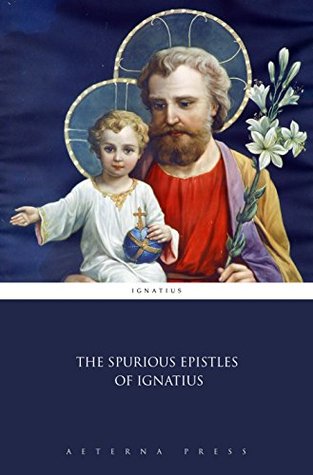- Bíblia
- Leia a Bíblia
- Versões da Bíblia
- Verso do dia
- Planos de Leitura
- Versos por Tópico
- Books of the Bible
- Imagens bíblicas
- Estude
- Comentários
- Concordâncias
- Dicionários
- Enciclopédias
- Sermões
- Bible Atlas & Maps
- BP Wiki
- Devocionais
- Devocionais de hoje
- Light of the World
- Todos os devocionais
- Inspirational Quotes
- Mais
- Picture Quotes
- Videos
- Inspirador
- Estudo da Bíblia
- O que a Bíblia diz
- Bible Q&As
- Daily Bread
- Bible by Genre
- Bible Stories
- Random Bible Verse
- Comunidade
- Store
The Spurious Epistles of Ignatius
by Ignatius of Antioch
— A Classic — Includes Active Table of Contents — Includes Religious Illustrations
From Syria even unto Rome I fight with beasts: not that I am devoured by brute beasts, for these, as ye know, by the will of God, spared Daniel, but by beasts in the shape of men, in whom the merciless wild beast himself lies hid, and pricks and wounds me day by day. But none of these hardships “move me, neither count I my life dear unto myself,” in such a way as to love it better than the Lord. Wherefore I am prepared for [encountering] fire, wild beasts, the sword or the cross, so that only I may see Christ my Saviour and God, who died for me. I therefore, the prisoner of Christ, who am driven along by land and sea, exhort you: “stand fast in the faith,” and be ye steadfast, “for the just shall live by faith;” be ye unwavering, for “the Lord causes those to dwell in a house who are of one and the same character.”
Aeterna Press
From Syria even unto Rome I fight with beasts: not that I am devoured by brute beasts, for these, as ye know, by the will of God, spared Daniel, but by beasts in the shape of men, in whom the merciless wild beast himself lies hid, and pricks and wounds me day by day. But none of these hardships “move me, neither count I my life dear unto myself,” in such a way as to love it better than the Lord. Wherefore I am prepared for [encountering] fire, wild beasts, the sword or the cross, so that only I may see Christ my Saviour and God, who died for me. I therefore, the prisoner of Christ, who am driven along by land and sea, exhort you: “stand fast in the faith,” and be ye steadfast, “for the just shall live by faith;” be ye unwavering, for “the Lord causes those to dwell in a house who are of one and the same character.”
Aeterna Press
BUY NOW
Kindle Edition, 68 pages
Published June 22nd 2016 by Aeterna Press
Se inscrever
© 2025 Bibleportal.com Todos os direitos reservados.

St. Ignatius of Antioch (35 -117)
(Ancient Greek: Ἰγνάτιος Ἀντιοχείας, Ignátios Antiokheías; ad c. 35 or 50 – 98 to 117), also known as Ignatius Theophorus (Ιγνάτιος ὁ Θεοφόρος, Ignátios ho Theophóros, lit. "the God-bearing"), was a student of John the Apostle, was the third bishop of Antioch, and is now counted among the Apostolic Fathers of the Christian Church.[En route to Rome, where according to Christian tradition he met his martyrdom by being fed to wild beasts, he wrote a series of letters which have been preserved as an example of very early Christian theology. Important topics addressed in these letters include ecclesiology, the sacraments, and the role of bishops. Ignatius modeled his writings after Paul, Peter, and John, and even quoted or paraphrased their own works freely, such as when he quoted 1 Cor 1:18, in his letter to the Ephesians.
... Show more